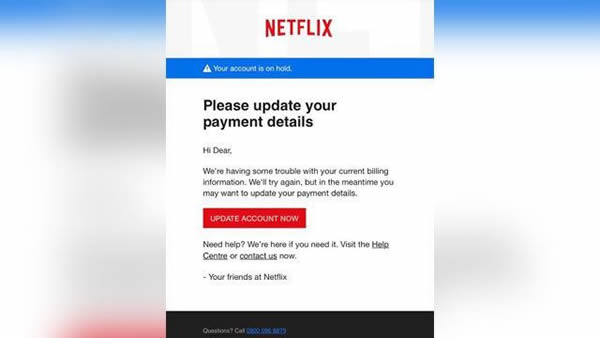A new Netflix phishing scam has been detected that attempts to fool Netflix subscribers into disclosing their login credentials and other sensitive information such as Social Security numbers and bank account numbers.
This Netflix phishing scam is similar to others that have been intercepted over the past few months. A major campaign was detected in October and another in November. The latest Netflix phishing scam confirms that the threat actors are now launching large-scale phishing attacks on a monthly basis.
The number of recent Netflix scams and the scale of the campaigns has prompted the U.S. Federal Trade Commission (FTC) to issue a warning to raise awareness of the threat.
The latest campaign was detected by an officer in the Ohio Police Department. As with past campaigns, the attackers use a tried and tested method to get users to click on the link in the email – The threat of account closure due to issues with the user’s billing information.
In order to prevent closure of the user’s Netflix account a link in the email must be clicked. That will direct the user to the Netflix site where login credentials and banking information must be entered. While the web page looks genuine, it is hosted on a domain controlled by the attackers. Any information entered on that web page will be obtained by the threat actors behind the scam.
The emails appear genuine and contain the correct logos and color schemes and are almost identical to the official emails sent to users by Netflix. Netflix also includes links in its emails, so unwary users may click without first checking the authenticity of the email.
Protect your MSP clients with the newest zero-day threat protection and intelligence against anti-phishing, business email compromise and zero-day attacks with PhishTitan.
Free Demo

Image Source: FTC via Ohio Police Department
There are signs that the email is not what it seems. The email is incorrectly addressed “Hi Dear”; British English is used, even though the email is sent to U.S. citizens; the email is sent from a domain that is not used by Netflix; and the domain to which the email directs users is similarly suspect. However, the scam is sure to fool many users who fail to carefully check emails before taking any action.
Consumers need to exercise caution with email and should carefully check messages before responding, no matter how urgent the call for action is. It is a good best practice to always visit a website directly by entering in the domain into the address bar of a web browser, rather than clicking a link in an email.
If the email is determined to be a scam, it should be reported to the appropriate authorities in the country in which you reside and also to the company the scammers are impersonating. In the case of Netflix phishing scams, emails should be sent to phishing@netflix.com.
While this Netflix phishing scam targets consumers, businesses are also at risk. Many similar scams attempt to get users to part with business login credentials and bank account information. Businesses can reduce the risk of data and financial losses to phishing scams by ensuring all members of the company, from the CEO down, are given regular security awareness training and are taught cybersecurity best practices and are made aware of the latest threats.
An advanced spam filtering solution is also strongly recommended to ensure the vast majority of these scam emails are blocked and do not reach inboxes. SpamTitan for instance, blocks more than 99.9% of spam and phishing emails and 100% of known malware.
For further information on anti-phishing solutions for businesses, contact the TitanHQ team today.
